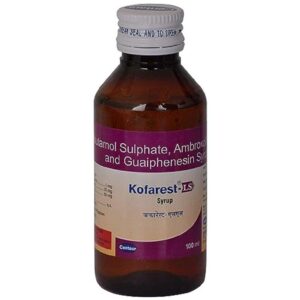AMBROXOL + MENTHOL
Ambroxol: Ambroxol is a medication used to treat respiratory conditions such as chest congestion and cough. It is commonly prescribed for conditions like bronchitis, chronic obstructive pulmonary disease (COPD), and asthma.
The mechanism of action of Ambroxol involves the stimulation of the production of mucus in the respiratory system. It helps to decrease the viscosity of mucus, making it easier to cough up and clear the airways. Additionally, Ambroxol has anti-inflammatory and antioxidant properties that help to reduce inflammation in the respiratory tract.
The standard dose of Ambroxol for adults is usually 30 mg to 120 mg per day, divided into three to four doses. However, the specific dosage may vary depending on the severity of the condition and the individual’s response.
Common side effects of Ambroxol include gastrointestinal disturbances such as nausea, vomiting, and stomach pain. It may also cause dry mouth, headache, dizziness, and allergic reactions, although these are rare. In very rare cases, Ambroxol has been associated with severe allergic reactions that may require immediate medical attention.
It is important to note that Ambroxol should not be taken without a prescription. The dosage and duration of treatment should be determined by a healthcare professional based on the individual’s condition and medical history.
Menthol: Menthol is a commonly used topical analgesic and cooling agent. It is derived from the leaves of the peppermint plant and is often added to various products, including cough syrups, lozenges, mouthwashes, and topical creams.
Menthol works by activating the TRPM8 receptors in the skin, which produces a cooling sensation and provides temporary relief from pain and itching. It also has mild local anesthetic properties.
In topical form, menthol is typically applied to the skin to alleviate minor pains, such as muscle aches, sprains, and insect bites. It is also found in many cough and cold medicines to provide relief from throat and chest discomfort associated with colds and flu.
The dose and application method of menthol can vary depending on the product and its specific formulation. It is important to carefully read the label instructions or consult a healthcare professional for appropriate usage guidelines.
Menthol is generally considered safe when used as directed. However, some people may experience side effects, which are usually mild and temporary. Common side effects of menthol include skin irritation, redness, rash, and a burning or stinging sensation at the site of application. These side effects are more likely to occur with higher concentrations of menthol or in individuals with sensitive skin.
In rare cases, allergic reactions to menthol may occur, resulting in severe itching, hives, difficulty breathing, or swelling of the face, lips, tongue, or throat. If any of these symptoms occur, immediate medical attention should be sought.
It is worth noting that excessive use or ingestion of menthol can be toxic and may lead to serious health complications. Therefore, it is important to follow the recommended dosage and application instructions to avoid any potential risks.
Overall, menthol is a widely used topical analgesic that provides temporary relief from pain and itching. However, it is always advisable to consult a healthcare professional or read product labels before using any medication to ensure safe and effective usage.

